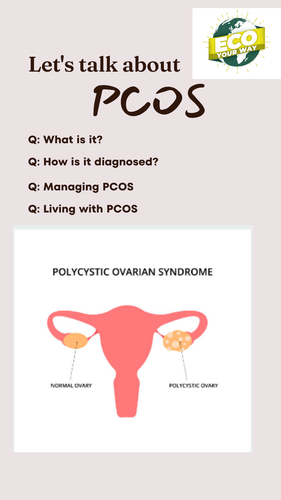Understanding PCOS: Causes, Diagnosis, and Living with the Condition
Aug 31st 2024
Polycystic Ovary Syndrome
Polycystic Ovary Syndrome (PCOS) is a common yet complex hormonal disorder that affects many women worldwide. Despite its prevalence, the main cause of PCOS remains a topic of ongoing research and discussion. This blog will discuss what is PCOS, recent statistics, diagnostic methods, treatment options, and strategies for living with the condition. We will also discuss the practical aspects of managing menstrual health, including the best sanitary pads for heavy periods and leak-proof options.
What is PCOS?
Polycystic Ovary Syndrome (PCOS) is a condition characterized by hormonal imbalances and metabolism problems that can affect a woman’s menstrual health, overall health and appearance. According to the Cleveland Clinic (2023), if you have PCOS, your ovaries
Create excess high levels of androgens, causing this hormone imbalance. The ovaries may develop numerous small cysts (fluid-filled sacs) and fail to release eggs regularly. This hormonal imbalance often leads to irregular, missed, or heavy menstrual periods, unpredictable ovulation, excessive hair growth, acne, and weight gain. PCOS is also linked to or increases the risks of other long-term health issues such as diabetes, high blood pressure, high cholesterol, sleep apnea, depression, and heart disease.
PCOS Statistics
PCOS is surprisingly common, affecting up to 13% of women of reproductive age globally (WHO, 2023). The World Health Organization, 2023 estimates that up to 70% of reproductive aged women with PCOS remain undiagnosed. In the United States alone, it is estimated that around 5 million women have PCOS. The prevalence of PCOS varies by population, but it is a leading cause of female infertility due to irregular ovulation. Understanding these statistics underscores the importance of awareness and effective management strategies for those affected by this condition.
How is PCOS Diagnosed?
Diagnosing PCOS typically involves a combination of medical history, physical exams, and laboratory tests. PCOS is often diagnosed using:
1. Clinical Symptoms: The presence of symptoms such as irregular, long, frequent, infrequent menstrual cycles, hirsutism (excessive hair growth), acne, and obesity.
2. Ultrasound: An ultrasound scan may reveal multiple small cysts on the ovaries, which is a common feature of PCOS. In some cases, the ovaries may not show any cysts despite the name polycystic.
3. Blood Tests: Hormonal levels are checked to identify imbalances. Blood tests are used to check hormone levels and glucose levels. Elevated levels of androgens (male hormones) and glucose levels and insulin resistance are often indicators of PCOS.
Healthcare providers may use the Rotterdam criteria, which require at least two of the following three features for a PCOS diagnosis:
- irregular or absent menstrual cycles,
- excess androgen levels, and
- polycystic ovaries.
It is important for women to consult with their healthcare professionals for an accurate diagnosis and personalized treatment plan.
Managing PCOS
Treatment for PCOS aims to manage symptoms and reduce the risk of long-term complications. There is no one-size-fits-all approach, but common treatment options include:
1. Lifestyle Changes:: Adopting a healthy diet and regular exercise can help manage weight and improve insulin sensitivity. Weight loss, even in small amounts, can help reduce symptoms and improve the regularity of menstrual cycles.
2. Medications: Various medications may be prescribed to manage symptoms:
- Hormonal Contraceptives: Birth control pills and other hormonal methods can help regulate menstrual cycles and reduce symptoms like acne and excessive hair growth.
- Anti-Androgens: Medications such as spironolactone can reduce androgen levels and alleviate symptoms like hirsutism.
- Metformin: Often used to manage insulin resistance, which is common in PCOS, and can help regulate menstrual cycles and reduce weight.
3. Fertility Treatments: For those struggling with infertility, medications to stimulate ovulation (like Clomiphene or Letrozole) and assisted reproductive technologies may be considered.
4. Surgical Options: In some cases, laparoscopic surgery to remove ovarian cysts or reduce the androgen levels may be recommended.
Living with PCOS
Living with PCOS involves managing both the physical and emotional aspects of the condition. Here are some practical tips for daily life:
1. Regular Monitoring: Keep track of your symptoms, menstrual cycles, and any side effects of medications. This information can be crucial for ongoing treatment adjustments.
2. Healthy Lifestyle: Incorporate balanced nutrition and regular physical activity into your routine. This not only helps manage weight but also improves overall well-being.
3. Mental Health Support: The challenges of dealing with PCOS can take a toll on mental health. If you feel overwhelmed, consider talking to a counselor or joining a support group to share experiences and strategies with others facing similar challenges.
4. Menstrual Management: For those with heavy periods, selecting the right menstrual products is crucial. The best sanitary pads for heavy periods can offer the absorbency and comfort needed to manage symptoms effectively. Look for pads that are both highly absorbent and designed to prevent leaks. Leak-proof sanitary pads are especially important for ensuring confidence throughout the day. Brands offering PCOS period pads often cater specifically to the needs of individuals with heavy or irregular periods, providing extra protection and comfort.
5. Consult Healthcare Providers: Regular check-ups with healthcare professionals are essential for managing PCOS and adjusting treatment plans as needed.
Conclusion
PCOS is a multifaceted condition with no single known cause, but it is manageable with the right approach. By understanding the symptoms, seeking accurate diagnosis, and exploring treatment options, women with PCOS can lead healthy and fulfilling lives. Addressing menstrual management with high-quality, leak-proof sanitary pads and the best products for heavy periods can significantly enhance daily comfort and confidence. Always remember, managing PCOS is a journey, and support is available every step of the way.

